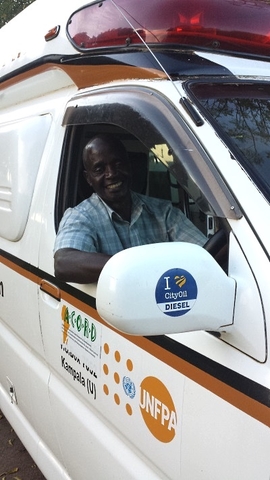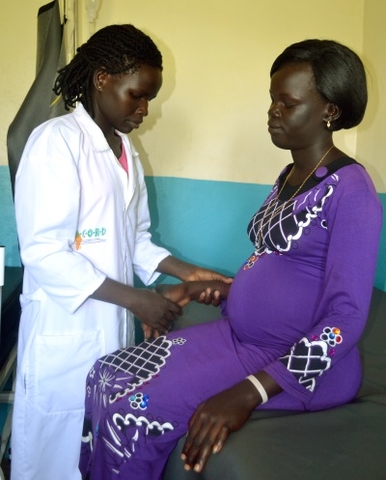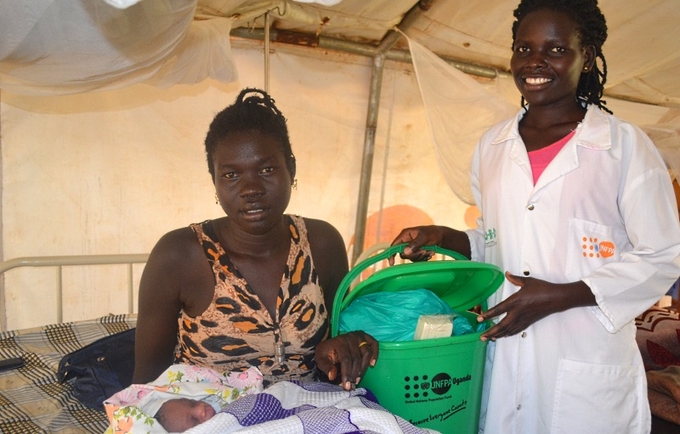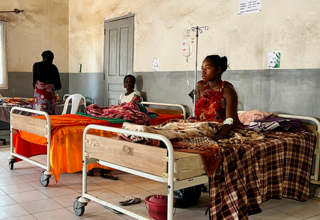ADJUMANI REFUGEE SETTLEMENT, Adjumani District, Uganda – When Laura Jurua’s labour pains began in the middle of the night, she knew she had to get to a health centre to deliver because she had been advised on the dangers of doing so at home. Expecting her third child, the 26-year-old refugee from South Sudan informed her neighbours she had gone into labour. They helped her call an ambulance.

© UNFPA / Evelyn Kiapi
For over 20 years, Hood Nsubuga, 56, had transported garbage from homes to Kampala’s dump site. Today, he helps mothers and babies in humanitarian settings – by driving an ambulance provided by UNFPA to transport expectant women to hospital.
When Ms. Jurua’s neighbours made the phone call that night, it was Mr. Nsubuga who arrived to ferry her to Biira HCIII. For this service, she will be eternally grateful.
Seated on a bed in the post-natal tent a day after delivery, she holds her baby joyfully. “Had the ambulance not turned up, I would have lost my baby,” she said. “The ambulance saved my life, and my baby’s.”
The ambulance driver
Until May 2014, Hood Nsubuga had enjoyed a comfortable life in the city working for Kampala City Council. For two decades his job of transporting garbage from people’s homes to the dump site allowed him to work at his own pace because, as he says, what he transported had no value to him.
A little over a year ago, he gave up this relatively comfortable existence for something far more challenging – to work in an emergency setting delivering mothers to hospital to ensure they give birth safely.
“When I was told that I had got a job in a refugee settlement over 400 km from the city, I did not hesitate,” he said. He was dispatched immediately and arrived to start his new task.
“I have to take care of them”
When you are carrying an expectant mother, you have to be very fast, but also very careful. - Hood Nsubuga, ambulance driver
Transporting mothers to the health centre has changed Nsubuga’s perspective on life. “When you are transporting garbage, you may take your time because there is no need to hurry. But when you are carrying an expectant mother, you have to be very fast, but also very careful,” he said.
“These mothers are in my hands. I have to take care of them.”
Among the women in the refugee camps, Mr. Nsubuga has become something of an unsung hero. He is recognized for the many lives he has saved by delivering women to the nearest health centre in their hour of need.
Ms. Jurua is one of many mothers who have benefited from the UNFPA-supported ambulance service.

Reaching health facilities in time
In emergency settings, reproductive health services like maternal health care may be scarce. Pregnant women are particularly vulnerable, their most critical need being access to health facilities to ensure a safe birth. But getting an expectant woman to a health centre for delivery can take a long time, putting her health – and that of her baby – at risk.
This is why UNFPA has provided an ambulance to traverse the terrain of the refugee settlements in Adjumani District – to ensure expectant mothers can reach local health facilities in time for a safe birth.
Since the influx began in mid-December 2013, more than 168,000 South Sudanese refugees have been assisted in Uganda and of these, more than 100,000 are being hosted in Adjumani District. On average 100 new refugees are received each day.
UNFPA’s work in supporting refugees
UNFPA, together with its implementing partners, the Agency for Cooperation and Research in Development (ACORD) and American Refugee Committee (ARC), supports nine health facilities in the refugee settlements in Adjumani district as well as Adjumani Regional Refferal Hospital, with the provision of reproductive health services and to conduct outreaches to the settlements and reception centres.
In Adjumani, 915 pregnant mothers received ANC services at the nine UNFPA/ACORD-supported health centres; this included 63 cases of underage mothers. Also, 275 mothers delivered at these health centres, while 202 new mothers received dignity kits.
Mothers in labour with complications are referred to Adjumani Hospital and are given dignity kits from the referred health facilities. A consignment of 260 dignity kits was distributed to the various facilities with support from UNFPA.
These days, Mr. Nsubuga is always on standby. Each day, he typically delivers two to three women to the health centre. “It doesn’t matter what time it is, day or night, I am on standby, always available to take mothers to the health centre. To ensure safe delivery, time is of the essence,” he said.
By Evelyn Kiapi



